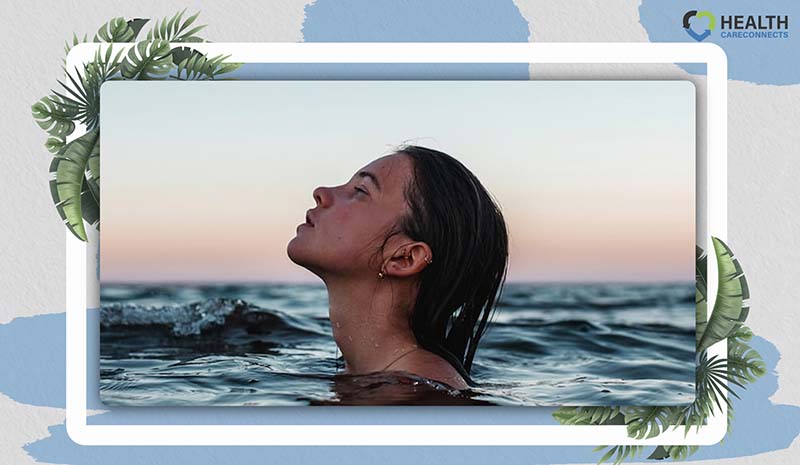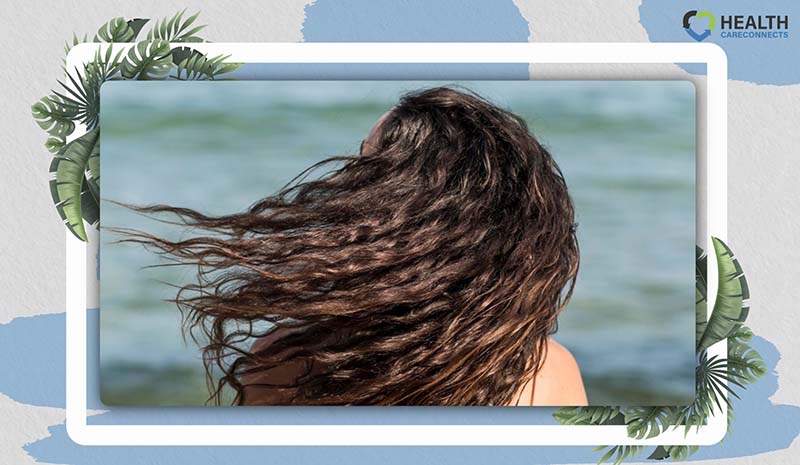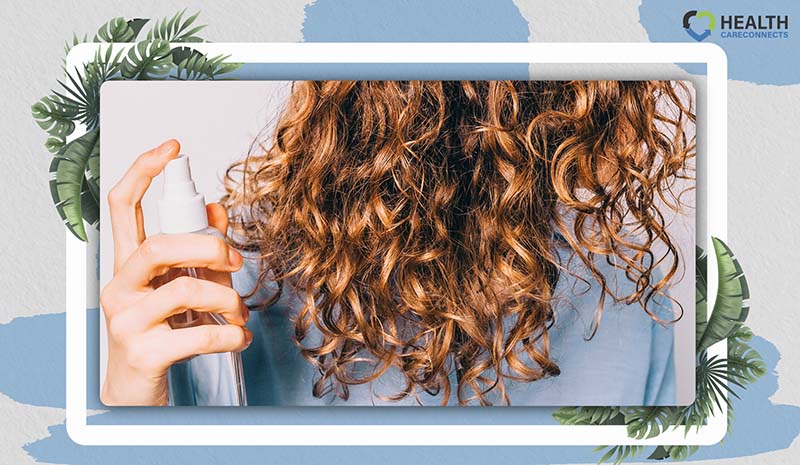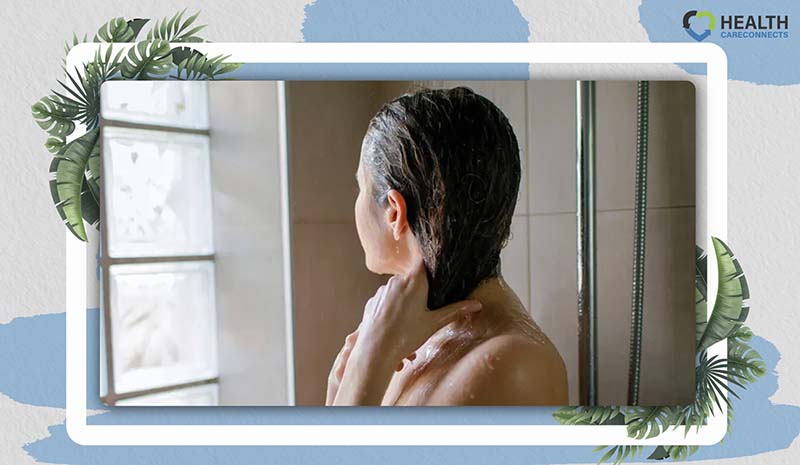Is salt water good for hair? Many people experiment with different treatments to enhance the appearance and texture of their hair, and using salt water has become quite popular. Advocates of salt water claim it helps achieve those desirable beachy waves.
However, while it may be tempting to use salt water regularly for its styling benefits, doing so could be detrimental. Frequent exposure to salt water can have adverse effects on both your hair and scalp. Please join us to find the answer to the above question.
Is Salt Water Good for Hair?
Salt water is often celebrated for its hair-enhancing qualities, attributed to its rich mix of minerals like magnesium and sodium. These elements can boost hair hydration and rejuvenation by settling on the hair cuticle, revitalizing dry strands effectively. However, exposure to salt water must be limited because using too much can cause hair to become dehydrated over time.
While small amounts of salt water can be beneficial, its high sodium content might undermine overall hair health. This is because salt can strip away natural oils, making hair prone to dryness, damage, and increased breakage, especially when compared to the effects of fresh water. The dehydrating impact of salt water is pronounced due to its elevated salt levels. To mitigate these negative effects, it’s advisable to rinse your hair thoroughly with fresh water after beach outings, helping to reduce potential damage.

How Salt Water Can Damage the Hair?
Excessive exposure to salt water can significantly compromise your hair’s health. High salt concentrations in ocean water actively draw moisture and essential oils from your strands, initiating a dehydration process. This leads to the lifting of hair cuticles, causing increased dryness and brittleness. Over time, such severe dryness can exacerbate hair loss due to heightened vulnerability to breakage. Moreover, the rough texture resulting from salt exposure often leads to tangling, complicating hair management and styling.
The effects of salt water are particularly harsh on dyed or chemically treated hair, which is already more susceptible to damage. Salt not only exacerbates this damage but also accelerates color fading, necessitating more frequent dye applications that can further weaken your hair.
The Benefits of Salt Water on the Hair
Salt water can offer several benefits for hair health and styling. It is naturally rich in minerals such as magnesium, potassium, and sodium, which can contribute positively to the overall condition of your hair. Here are some of the notable benefits:
- Scalp Exfoliation and Improved Blood Circulation: Salt water can exfoliate the scalp, removing dead skin cells and stimulating blood flow. Enhanced blood circulation helps deliver more nutrients to the hair follicles, promoting hair growth. Additionally, incorporating a scalp massage or using a clinically proven natural hair serum can further aid in this process.
- Anti-Fungal Properties: Salt water possesses anti-fungal properties that can alleviate discomfort associated with flaky scalps and dandruff. However, it’s essential to use salt water in moderation, as excessive exposure can dry out the skin.
- Natural Cleansing: Think of salt water as a natural shampoo. It effectively removes excess sebum and oils from the scalp, resulting in smoother hair. This is particularly beneficial for individuals with greasy hair types.
- Increased Volume and Body: Salt water crystals lift the hair cuticle, adding volume and body to your hair. This effect creates the illusion of fuller hair roots and facilitates the achievement of beachy waves. The formation of extra crosslinks in the hair, induced by salt and magnesium sulfate, contributes to the wave or curl formation, enhancing the texture of your hair.

How to Use Salt Water on Hair in 2 Cases
If you have oily hair and crave a bit more texture, saltwater could be just the ticket. Here are two effective methods to apply saltwater to your hair:
Salt Hair Spray
Salt hair sprays offer a convenient way to infuse your hair with salty goodness. Simply grab a bottle of salt hair spray and spritz it through your hair, paying extra attention to the roots for added body. The beauty of salt hair spray is its versatility—you can adjust the amount according to your preference.
You’ll find a variety of salt hair sprays available in stores, some of which may contain additional ingredients for enhanced protection. Alternatively, you can easily craft your own salt hair spray at home using a spray bottle, salt, and water.

Swimming in the Sea
Living near the coast has its perks, including the opportunity to naturally expose your hair to saltwater by taking a dip in the sea. After enjoying a swim, revel in the enhanced texture and body of your hair—it’s no wonder they call it “beach waves.” This effortless method effortlessly incorporates saltwater into your hair care routine, leaving you with that coveted beachy look.
Whether you opt for a convenient salt hair spray or indulge in a refreshing swim in the sea, incorporating saltwater into your hair care regimen can add texture and body, particularly beneficial for those with oily hair.
Tips for Protecting Your Hair When Exposed to Salt Water
If you want to enjoy the benefits of salt water for your hair, you should take precautions to minimize possible damage. Here are some helpful tips:
Choose a Protective Hairstyle
Opt for a protective hairstyle such as braids or a bun if you don’t have a swim cap handy. While it won’t completely shield your hair from salt water, it can significantly reduce the amount of exposure.
Use Nourishing Hair Care Products
Adapt your hair care routine to counteract the effects of frequent salt water exposure. Incorporate plenty of nourishing and highly moisturizing products into your regimen.
Consider investing in high-quality hair masks enriched with seed oils like olive oil, argan oil, or coconut oil. These oils are cost-effective and can make a remarkable difference in minimizing sea-induced hair damage.
Use a Hair Cap
When swimming, wearing a swim cap can effectively prevent your hair from getting soaked in salt water. For added protection, consider applying a moisturizing product underneath the cap.
Apply a Barrier Product
Prior to entering the sea, apply a barrier product such as a hair mask or oil to create a protective shield against salt water. Even a simple rinse with fresh water before swimming can offer some level of protection if barrier products are unavailable.
Rinse Hair Thoroughly with Clean Water
After swimming in the sea, rinse your hair thoroughly with fresh, salt-free water. This helps to wash out excess salt, preventing it from crystallizing and potentially causing breakage.
Keeping an extra bottle of water handy at the beach specifically for rinsing your hair is a practical and beneficial practice.

Can You Leave Salt Water in Your Hair Overnight?
Leaving salt water in your hair overnight is not recommended. Hair stylists like Nadia Dean, a Senior Stylist at John Frieda salons, advise against it. Salt water can have a drying effect on your hair, leaving it parched and brittle if left in for too long.
It’s best to rinse your hair with fresh water as soon as possible after swimming, even if it means using bottled water available at the beach. This helps to remove the salt and prevent your hair from becoming excessively dry and damaged.
Does Sea Salt Cause Hair Loss?
Sea salt itself is not typically considered a primary cause of hair loss. However, excessive use of sea salt spray may contribute to hair loss over time. This is because the high sodium content in sea salt can dry out and dehydrate hair strands, increasing the likelihood of breakage.
For individuals with generally healthy hair, moderate use of salt is unlikely to result in hair loss. However, it’s essential to use sea salt spray in moderation and to monitor the moisture levels of your hair. This allows you to determine if your hair type is compatible with the use of such products. If you notice increased dryness or breakage, it may be advisable to limit or discontinue the use of sea salt spray.
Conclusion
In conclusion, addressing the question “Is salt water good for hair?” reveals that the answer is not entirely straightforward and depends on several factors.
Salt water, or ocean water, naturally contains beneficial minerals that can hydrate your hair. However, prolonged exposure to salt water can also lead to moisture loss, resulting in dryness and potential damage to your strands.
To counteract the adverse effects of salt water, we recommend using protective hair oils, regularly conditioning your hair, and applying nourishing hair masks. For those experiencing thinning or hair loss due to saltwater exposure, exploring hair restoration methods like hair transplants or hair growth products might be beneficial.
Ultimately, maintaining a balance and taking proactive steps to protect your hair when exposed to salt water is essential for its overall health.
For those seeking more information and honest product reviews, I recommend visiting HealthCareConnect. Explore firsthand experiences from users and gain valuable insights to help inform your decision.

Dr. Joyce Slater: Your Guide to Informed Health Choices
Dr. Joyce Slater shines as a distinguished expert in the field of nutrition and public health. Contributing her vast expertise to HealthConnectbc, she embodies a deep-seated passion for enhancing public well-being. As a respected figure in her field. Dr. Slater’s academic journey and professional achievements are nothing short of inspirational.
Holding a significant position as a researcher and educator, Dr. Slater has delved deeply into the intricacies of food literacy and nutritional science. Her work, prominently featured in numerous esteemed scientific publications, underscores her dedication to expanding our understanding of food’s role in health and society.
At the heart of Dr. Slater’s professional ethos is a profound desire to positively impact individual lives through education and research. She often says, “Empowering people with the knowledge to make healthier choices is the most rewarding aspect of my work.” This principle is the cornerstone of her involvement with HealthConnectbc, where she strives to provide reliable and practical health advice.
Dr. Slater’s contributions to HealthConnectbc are multifaceted: academically, she offers insights into the complex world of nutrition and health, enhancing both public understanding and professional practices. Additionally, she is instrumental in guiding and inspiring the next generation of health professionals, thus fostering future excellence in the field.
Juggling rigorous research with her educational duties, Dr. Slater demonstrates an unwavering commitment to her profession. Her approachable nature and genuine concern transcend the confines of academia, touching the lives of everyone she interacts with. Dr. Slater looks forward to continuing her journey of discovery and education, dedicated to the ongoing improvement of public health and nutrition.
At HealthConnectbc, Dr. J. Slater is not just a contributor; she is a guiding light, dedicated to enlightening and motivating individuals towards a healthier and more informed lifestyle.
PUBLISHED ARTICLES
- Food literacy competencies: A conceptual framework for youth transitioning to adulthood (2018)
- Self-perceived eating habits and food skills of Canadians (2016)
- Challenges to acquiring and utilizing food literacy: Perceptions of young Canadian adults (2016)
- Socio-demographic and geographic analysis of overweight and obesity in Canadian adults (2009)
- Sustainable well-being: Concepts, issues, and educational practices (2014)

